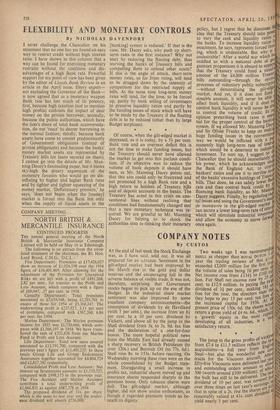FLEXIBILITY AND MONETARY CONTROLS
By NICHOLAS DAVENPORT
MUST challenge the Chancellor on his statement that no one has yet found an easy way to restrict credit without high interest rates. I have shown in this column that a way can be found for exercising monetary restraint without the costliness and dis- advantages of a high Bank rate. Powerful support for my point of view has been given by the editor of Lloyds Bank Review in an article in the April issue. Every expert— not excluding the Governor of the Bank— is now agreed that as a monetary weapon Bank rate has lost much of its potency, first, because high taxation (not to mention high profits) cushions the impact of dear money on the private borrower; secondly, because the public authorities, which have the lion's share of total bank accommoda- tion, do not 'react' to dearer borrowing in the normal fashion; thirdly, because bank assets have come to consist predominantly of Government obligations (instead of private obligations) and because the banks' money market assets are represented by Treasury ,ills (or loans secured on them). I cannot go into the details of Mr. Man- tling Dacey's fascinating paper, but it blows sky-high the dreary arguments of the monetary fanatics who would go on dis- inflating by higher and higher 'Bank rates and by tighter and tighter squeezing of the money market. 'Deflationary pressure,' he says, 'does not begin when the [money] market is forced into the Bank but only when the supply of liquid assets in the
[banking] system is reduced.' If that is the case, Mr. Dacey asks, why push up short- term rates in the first instance? Why not start by reducing the floating debt, thus starving the banks of Treasury bills and compelling them to unload other assets? If this is the angle of attack, short-term money rates, so far from rising, will tend to be dragged down by the intensity of competition for the restricted supply of bills. At the same time long-term money rates will tend, for the time, to be forced up, partly by bank selling of investments to preserve liquidity ratios and partly by the funding issues of stock which will have to be made by the Treasury if the floating debt is to be reduced (other than by large Budget surpluses).
Of course, when the gilt-edged market is depressed, as it is today, by a 5+ per cent. Bank rate and an overseas deficit this is not the time to make funding issues, but the Treasury should never have allowed the market to get into this parlous condi- tion. If its objective was to reduce the volume of bank deposits it should have seen, as Mr. Manning Dacey points out, that this aim could only be frustrated and not promoted by a high Bank rate and a high return to holders of Treasury bills and of deposit accounts in the banks. The Treasury has acted in this crisis on con- ventional lines without realising that conditions had fundamentally changed and that a new monetary technique was re- quired. We are grateful to Mr. Manning Dacey for helping us to shock the authorities into re-thinking their monetary
SPECTATOR, APRIL 20, 195 policy, but I regret that he dismisses 01 idea that the Treasury should take We; to vary the cash and liquidity ratios the banks. To increase liquidity ratios b) enactment, he says, represents forced fu it ing, which is undesirable. But why is undesirable? After a world war which has t saddled us with a national debt of gn3c 1 gantuan proportions it is absurd to suPP-j, that the Treasury could fund a sizeau" 41. amount of the £4,800 million Treasuil ,t bilis outstanding—through the nallla processes of voluntary public subscriPtil —without demoralising the gilt-edge lio market. And yet, if it does not fund sizeable amount, it will never be able It affect bank liquidity, and if it does 111 isot control bank liquidity it will never be atilt to control the volume of credit, In opinion prescribing bank rates is eS5e`; rest, tial for the proper control of the banic'n' system. If we allowed Mr. Manning DaC° and Sir Oliver Franks to keep on makil huge funding issues in the convention way we would be inflicted with ,a k
st
manently high long-term rate of inter`q1 04 investment. To sum up, I suggest to 11'; indul qst
which would be a deterrent to
Chancellor that he should immediatelY his power, which he acknowledges ull,drol the Bank of England Act, to con -4 bankers' ratios and use it to steriliSe sou of the banks' excessive holdings of Treasull ire bills. That done, he can safely lower rate and then control bank credit bY fluencing bank liquidity, as Mr. Malin' ik& Dacey suggests. Finally, by regulating Cal/st tat issues and using the Government ltg' de manoeuvre in the gilt-edged market intern can secure a lower long-term rate of inYr which will stimulate industrial invesimeid and allow the economy to move for" once again.


















































 Previous page
Previous page